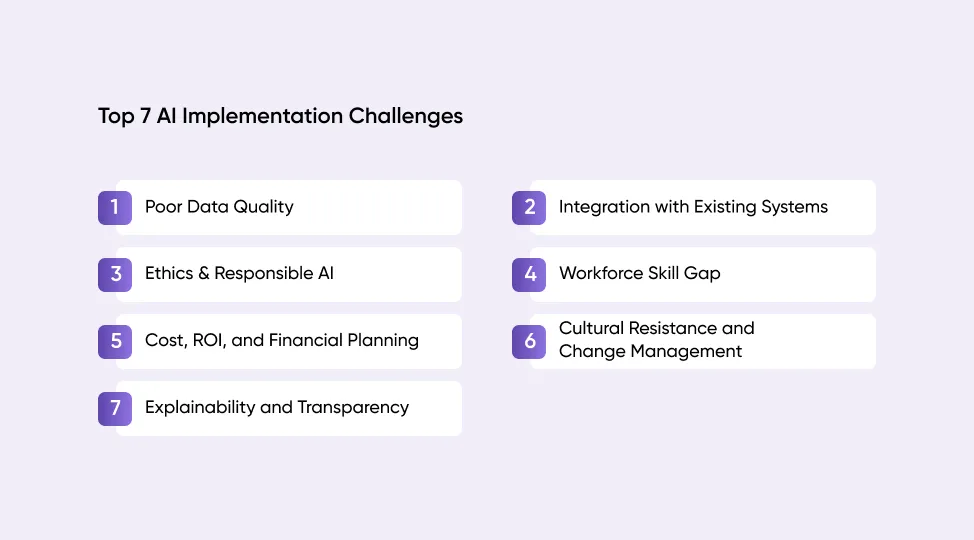Artificial intelligence is seemingly everywhere; it promises a smarter decision, quicker process, and plenty of growth opportunities. The possibilities appear to be endless, whether it is automation of repetitive tasks, building intelligent content pipelines through AI development services, or finding answers to questions buried in the piles of data. However, despite the hype, most organizations find it difficult to translate that potential into actual, quantifiable change.
It is not the AI technology which is at fault. Current AI tools are potent, more available, and ever simpler to implement. The actual challenges are in the way businesses plan, incorporate, and implement these solutions. Even the most promising AI initiatives can be affected by such issues as low quality of data, AI ethics, fragmented systems, skills shortages, and cultural resistance.
Then, how can organizations achieve the gap between AI hype and reality? What can you do to be sure you will get value out of your AI investment instead of another stalled project?
In this blog, we will briefly discuss the most common AI implementation challenges and provide some effective tips on how to overcome them. This will give you a clear path to take potential and convert it into performance whether you are new to AI or are looking to scale up your current initiatives.
Common AI Implementation Challenges and Their Solutions

#Challenge 1. Poor Data Quality in AI Implementation in Business
Any AI initiative is based on data. Even the most sophisticated AI algorithms like Agentic AI can barely deliver something meaningful without clean, structured and well-labeled data. The challenges that organizations are presented with usually involve fragmentation of data, irregular formatting, missing values and historical bias. The issues may result in faulty estimates, faulty suggestions and eventually, fruitless AI initiatives. One of the first, and more important steps to effective AI implementation in business, is to make sure your data is accurate, comprehensive, and ready to be fed into AI systems.
Here is what you can do:
- Do a complete data audit to determine gaps and inconsistencies.
- Standardize formats, centralize datasets to decrease silos.
- Use data cleaning and augmentation, often with the help of AI development services, prior to training models.
- Monitor the quality of data and update the datasets on a regular basis.
- Use bias detection/correction methods to make it fair.
#Challenge 2: Integration Difficulties While Implementing AI Technology
A lot of organizations are using legacy IT systems which were not created to handle AI workloads. The process of integrating modern AI tools with these older systems may be complicated and result in compatibility, security, and scalability problems. The absence of planning can cause the AI language models to fail to access the required data, or can lead to the decline in performance with the increase in workloads. The ability to integrate smoothly and preserve system stability is critical to the successful scaling of AI initiatives and the value that they bring across the enterprise.
Here are some ideal solutions:
- Connect AI tools to legacy systems by using middleware or API layers.
- Plan a phased integration to transition or modernize the key elements.
- Implement a modular cloud-ready infrastructure that will accommodate scaling requirements.
- Leverage Generative AI development services to facilitate smoother integration and modernization of legacy systems.
- Perform tests to ensure compatibility and optimal performance of hybrid environments that integrate on-premise and cloud infrastructures, thereby achieving flexibility.
#Challenge 3: Ethics & Responsible AI
Ethical concerns are becoming even more important as organizations embrace AI. Implementing AI technology without overseeing it may result in biased decision-making, violation of privacy, and loss of trust on the part of stakeholders. In addition, the cost of ethical AI practices and the cost of implementing AI ethically are some of the financial issues that are likely to be involved in the process of establishing ethical AI practices. Businesses have to deal with regulations, principles often emphasized in any thorough generative AI implementation guide, be transparent, and have AI outputs that match organizational values. Even technically successful projects may be ruined by ethical lapses, and it is essential to incorporate ethical data practices and responsible AI governance at the early stages.
To prevent this, you should:
- Provide definite ethical AI principles according to company values and regulations.
- Introduce ethical data use, such as privacy protection, anonymization, and bias monitoring.
- Develop a regular audit to make sure that AI models generate fair and unbiased results.
- Train teams on the use of responsible AI and decision-making.
- Include the responsible cost of implementing AI in project budgets so as to prevent shortcuts.
#Challenge 4: Workforce Skill Gap
The implementation of AI requires specialized skills in fields such as data science, machine learning, and system integration. Nonetheless, there is a lack of these skilled professionals in most organizations. Such talent deficiency may cause the slowing of projects, the growth of dependency on external vendors, and the restriction of maintaining and scaling AI solutions in-house. Teams should also be equipped with the knowledge of how to interpret AI outputs and incorporate them into business decision-making, in addition to possessing the necessary technical skills. When it comes to implementing AI technology, a lack of proper training and resources may prevent it from achieving its potential.
You can address these issues by applying these solutions:
- Invest in the upskilling of current employees in the fields of AI.
- Establish talent pipelines by collaborating with universities, training platforms, or AI consultancies.
- Promote cross-functional teams which would be a combination of technical and business skills.
- Fill the gaps by using AI-as-a-Service (AIaaS) platforms in the initial stages of adoption.
- Establish mentorship opportunities in which more experienced workers in the field of AI can advise newer members of the team.
#Challenge 5: Cost of implementing AI and Financial Planning
One of the most common AI implementation challenges is that it may be more expensive than expected. The cost not only involves the software and infrastructure, but also data preparation, training, and constant maintenance. A lack of a financial plan can lead to AI projects being over-budget or unable to generate any measurable returns. In certain situations, failing to track ROI causes organizations to abandon promising initiatives too soon. Proper budgeting and performance monitoring are crucial to making AI investments financially viable and aligned with long-term business objectives.
Here is what you should prefer to do:
- Establish specific KPIs to use in measuring ROI at the beginning of the project.
- Start small with pilot projects to prove value then scale.
- Consider implementing a hybrid infrastructure to manage operational costs. effectively
- Include a budget to keep models up to date, retrain staff, and provide ongoing support.
- Consistently check cost vs. performance to make sure it remains viable.
#Challenge 6: Cultural Resistance and Change Management
Even the most advanced AI technology will not work if the individuals who are supposed to utilize it are not open to change. Employees may be afraid of losing their jobs, distrust the work of AI, or struggle to adapt to new processes. These issues may hinder the adoption and potential success of AI technology implementation if proper communication and inclusive planning are not in place. Technical rollout is only half the work. Change management is equally important, and it involves building trust, demonstrating value, and empowering teams rather than replacing them.
These solutions would help you:
- Make clear and early communication to all stakeholders about the purpose and benefits of AI.
- Engage the employees in AI planning and implementation in order to promote ownership.
- Offer training and resources to make teams fit new workflows.
- Develop confidence by highlighting success stories in the organization.
- Frame AI as an aid to, rather than a substitute of, human abilities.
#Challenge 7: Explainability and Transparency
AI models are complex and in many cases act as black boxes, where it is unclear why the output comes without reasoning. Such unexplainability may undermine trust, particularly when it is applied in regulated sectors or when the decisions made by AI have a direct effect on the customers. It is essential that stakeholders (executives and end-users) know how AI makes its conclusions to be accountable and make informed decisions. The lack of transparency can lead to compliance problems, reputation loss, and poor adoption levels when using AI technology.
What you should ideally consider doing:
- Apply explainable AI (XAI) methods to make the output of models more interpretable.
- Offer detailed explanations that are specific to various audiences (technical vs. business).
- Record the decision-making procedures and keep model audit trails.
- Be transparent about data sources, feature selection and training procedures.
- Make explainability tools regularly and update to ensure they align with changing AI models.
Addressing these issues early on can make the difference between an AI project that brings quantifiable outcomes and one that gets delayed. Technical preparedness, coupled with cultural fit and transparent governance, will enable organizations to transform potential impediments into long-term success factors for AI.

Strategies That Apply to AI Implementation Challenges
While the potential of AI is vast, moving from small-scale experiments to measurable, scaled success requires more than just technology—it demands a practical AI Implementation Strategy.
The most successful organizations don't experiment endlessly; they utilize a clear AI Implementation Framework that directly links technology to business value. Six core steps define this framework:
- Discovery and Alignment: Tie AI initiatives to significant business outcomes, not just cool technology.
- Use Case Prioritization: Wisely use resources by targeting projects with the highest predicted ROI.
- Build vs Partner Strategy: Decide whether to build in-house or engage an AI implementation consultant to balance speed and long-term control.
- Validation Strategy: Prove the AI works by building and testing a Minimum Viable AI (MVAI) with real data before scaling.
- Scaling and Operational Strategy: Utilize MLOps principles to integrate AI from test mode into daily business workflows seamlessly.
- Continuous Improvement and Governance: Ensure the AI is a long-term asset by auditing performance, keeping models up to date, and adhering to compliance and ethical guidelines.
This step-by-step approach is crucial for minimizing risks, accelerating adoption, and ensuring that AI technology delivers measurable, long-term value.
💡 Suggested Read: AI Implementation Strategy: Practical Framework for Startups
Your Next Steps in AI Implementation
AI technology implementation is not only confined to the deployment of algorithms, but also involves creating the conditions in which they can thrive. By detecting common problems early and implementing targeted solutions, businesses can harness AI as a powerful tool capable of producing significant results. The combination of technical preparedness, ethical AI practices, multifunctional teamwork, and a culture of adaptive change succeeds. The principles will help businesses not only overcome AI implementation challenges and mitigate risks but also realize the full potential of AI to reap short-term benefits and gain a long-term competitive advantage.

Tags
ai implementation
Artificial Intelligence



 Facebook
Facebook
 Twitter
Twitter
 LinkedIn
LinkedIn
 Pinterest
Pinterest







